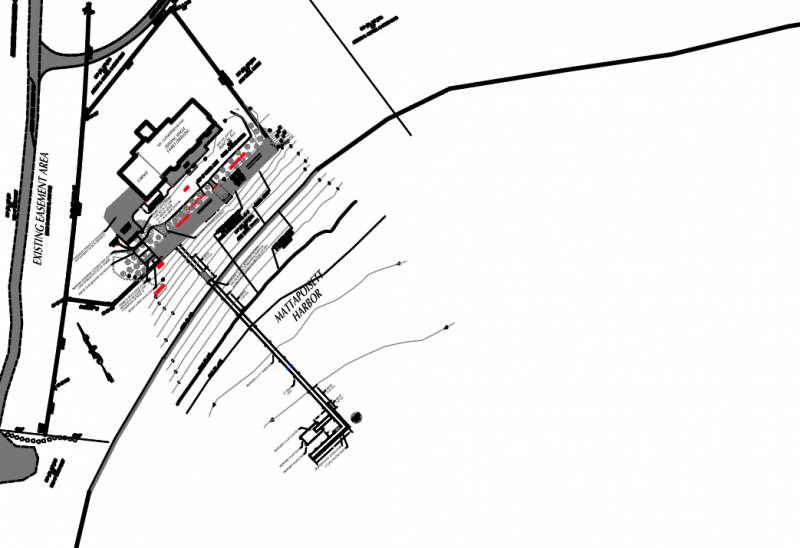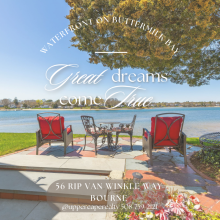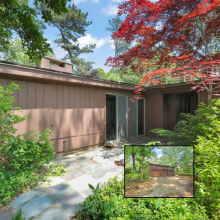290-foot pier gets important permit, still several hurdles to go
This week, Dave and Laurie DaRosa were granted a crucial permit for their proposed pier on Goodspeed Island.
For more than a year the 290-foot proposed pier has been a source of contention in town, drawing the ire of many residents who believe it is too large, will obstruct public use of the harbor and will harm the natural habitat. They have voiced that opposition at several public hearings in the last year as well as through an opposition group.
On Wednesday, Massachusetts Department of Environmental Protection Commissioner Martin Suuberg approved the wetlands permit for the pier. Last October, the town's Conservation Commission denied that permit, which regulates activity in and near wetland areas.
The commission members, saying they were concerned with the pier's impact on the habitat, asked for additional experts to be brought in to evaluate the pier at the DaRosas' expense. The couple declined and the commission denied the permit.
The DaRosas then appealed that decision to the state where the DEP found the Commission's arguments "unpersuasive."
The DaRosas’ attorney, John Gushue, said he and his clients expected the decision to go in their favor.
“There was no basis for the town to deny the wetlands permit in the first place, and there was similarly no basis for the town to appeal the decision that the DEP initially made on the wetlands permit,” he said.
Gushue added, “The most significant finding in the DEP decision…was that there was no adverse impact on shellfish associated with the DaRosa pier.”
The town can continue to pursue an appeal and file a motion to reconsider the decision, but Conservation Commission Chair Bob Rogers said he wouldn’t recommend that action.
“I think we took it as far as we could for the wetlands protection,” said Rogers.
"The jury is still out," said Town Administrator Mike Gagne about seeking further action.
He said the potential damage the pier could cause to a nearby sewer main, in the event of a storm breaking it apart, is still a worry.
Gagne said he will speak with the town's attorney as well as the Conservation Commission about whether or not the town should pursue and appeal.
"We’re weighing our options," Gagne said.
In addition to the wetlands permit, the pier has gotten necessary approval from the Army Corps of Engineers. But there are still a number of hurdles for the DaRosas to clear before the pier can be built, and the next step will be at Plymouth Superior Court.
Building Commissioner Andy Bobola denied the DaRosas a building permit this summer on the grounds that the pier did not meet town zoning bylaws. In August, the Zoning Board of Appeals upheld that decision, and in September the DaRosas filed their appeal with the court.
The pier also needs a Chapter 91 Public Waterfront Act License from the DEP (a different branch than that covering the wetlands permit). The license covers public access, usage and navigational issues associated with the pier – three areas that many townspeople say the structure will inhibit. That license cannot be issued, however, without a building permit.
“I think the best chance we have to stop it is through the zoning denials they were just issued and through the Chapter 91 process of the DEP,” said Rogers. “I think that’s where the town has a stronger argument.”
That sentiment was, in part, echoed in a statement released by the Friends of Mattapoisett Harbor, a group formed in opposition to the current design of the pier.
An Oct. 4 post on the group's Facebook page stated: "We are disappointed with the DEP's decision, but we appreciate the efforts made by the Town during the appeals process."
The Friends called for continued support and said, "Thanks to the efforts of many Mattapoisett residents and visitors, we have made a very strong case against the pier so far in the Chapter 91 licensing process. The Goodspeed Island pier is still far from becoming a reality."
It may be a while before the DaRosas, the town and residents get an answer. Gushue said it could take at least a year for the court to come to a decision on the building permit.











